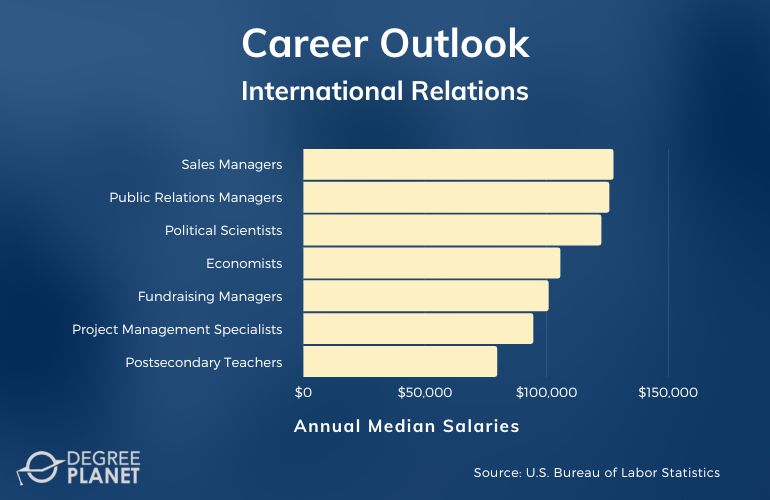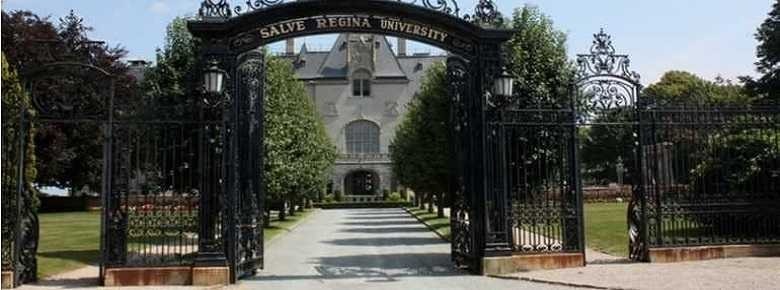A masters in international relations is a strategic degree path for those who want to develop a deeper understanding of how people and society work.

Many companies seek well-rounded individuals who know how people function and how actions impact society. This can make professionals with a background in international relations valued assets for employers and organizations.
Editorial Listing ShortCode:
So, you might consider graduate programs in international relations if you have a passion for furthering your knowledge in international relations and building valuable skills in this area of expertise.
Masters in International Relations Programs Online

If you have a passion for themes surrounding governance, peace, aid, communication, and community support, then you might want to consider masters degree in international relations.
Online masters in international relations programs focus on teaching students how quickly the world is changing and how important adaptability is in various settings. Online international relations degree programs also teach how necessary it is for leaders to comprehend how security, economies, geopolitics, and the environment are linked.
Editorial Listing ShortCode:
Upon completing a master’s degree in international relations, you will likely have gained in-depth experience in helping organizations and companies with real-world challenges on an international scale. The skills you can gain during your studies could help you identify and analyze client issues in order to determine plausible recommendations for addressing various problems.
Those who choose to undertake a master’s degree in international relations may develop a keen understanding of the following areas of interest:
- Human rights
- Diplomacy
- International law and economics
- Peace and conflict resolution
- Security and terrorism
- Anthropology
- Philosophy and Religion
Students that complete masters programs in international relations will likely find that their degree lets them gain employment in a range of fields. For instance, graduates may work in foreign service, public relations, political science, or community service, among others.
International Relations Careers and Salaries

Graduates in this field can make a difference in various career paths across multiple industries. For instance, some IR professionals might work in development agencies, governments, global businesses, non-profit organizations, and cultural institutions.
According to the Bureau of Labor Statistics, here are some potential career paths, along with their median salaries, that could be associated with international relations.
| Careers | Annual Median Salaries |
| Sales Managers | $127,490 |
| Public Relations Managers | $125,780 |
| Political Scientists | $122,510 |
| Economists | $105,630 |
| Fundraising Managers | $100,810 |
| Project Management Specialists | $94,500 |
| Postsecondary Teachers | $79,640 |
| Social and Community Service Managers | $74,000 |
| Public Relations Specialists | $62,800 |
| News Analysts, Reporters, and Journalists | $48,370 |
Many who choose to study this degree do so because they are passionate about making a difference in the world.
A number of career paths are also expected to see continued growth. For example, the Bureau of Labor Statistics projects 8% job growth for public relations managers over the next ten years. A masters degree may also help you qualify for more senior or leadership roles.
Editorial Listing ShortCode:
The types of roles and salaries you may qualify for can depend on a number of factors, such as your prior education and experience, degree concentration, personal interests, and chosen industry.
MA in International Relations Curriculum & Courses

There are numerous career paths to choose from when studying for a masters degree in international relations. Depending on the university you attend, you’ll likely also encounter different course concentrations and curriculums. Here are some examples of the types of courses you might take:
- Structured Analytic Techniques: You can learn more about multiple qualitative structured analytical techniques and tools to generate forecasts, avoid major mistakes, and structure analysis.
- Intercultural Communication: Those studying this course will examine topics like management and adaptation, cross-cultural communication, and intercultural negotiation to understand how people interact across cultures.
- Planning, Forecasting, and Decision Making: When you study this course, you’ll be introduced to different planning and forecasting techniques utilized in foreign policy and defense communities.
- Global Governance: During this course, you’ll learn the complex interactions between various initiatives, individuals, and governments and how these interactions are essential to world politics.
- International Studies: History, Theory, Practice: This course focuses on the different principles and perspectives that underlie divergent views in international relations.
- Introduction to Economic Theory: In this course, you’ll learn the foundational concepts of micro and macroeconomics alongside the principles of modern economic theory.
- Quantitative Methods: Research Design and Statistical Analysis: During this course, you’ll learn the core competencies of data collection and management, research design, and statistical analysis.
- Leadership Communication Strategies: This course helps you develop professional leadership communication skills for oral and written presentations while teaching effective communication strategies.
- Multicultural Negotiation and Crisis Management: During this course, you’ll learn multinational negotiation techniques and strategies that can be used to resolve ethical dilemmas.
- Real-World Strategic Planning: This course teaches basic tools to equip you with the skills needed to map your ecosystem, diagnose sustainability, and detect mission drift.
These are only a few of the courses you could encounter when studying for this degree. It could be helpful to browse the curricula of various programs of interest.
International Relations MA Admissions Requirements

The admission requirements for an international relations master’s degree will differ from school to school. Despite there being different admission rules for a master’s degree in international relations, there are a few general requirements, such as the following:
- GRE or GMAT scores (only some schools require them)
- Minimum GPA of 3.2, on average
- Relevant bachelor degree from an accredited institution
- Official undergraduate transcripts
- Statement of intent
In addition to these requirements, some schools ask for an application fee when you submit your application packet.
International Relations Master Programs Accreditation

Before undertaking a master’s in international relations, it’s strategic to consider the accreditation statuses of your prospective schools.
Regional accreditation is the preferred accreditation status because it is the most prestigious, offers more benefits to students, and is more widely recognized by employers. The Council for Higher Education Accreditation (CHEA) recognizes seven credible regional accrediting organizations. You can also check their school directory to verify the statuses of any schools of interest.
Editorial Listing ShortCode:
An accredited degree might qualify you for doctoral programs or industry certifications. Many doctoral programs, like a PhD in International Relations or PhD in Strategy online, only recognize course credits and degrees from accredited colleges and universities. In addition, those who choose to attend an accredited school are more likely to be eligible for federal aid and corporate reimbursement plans.
Financial Aid and Scholarships

There are a few financial aid options available to those who want to further their education with a master’s in international relations. For example, there are scholarships, federal aid, state aid, and internship opportunities for qualifying students.
If you go the federal aid route, it’s necessary to fill out the Free Application for Federal Student Aid (FAFSA). This form can help determine your eligibility for various forms of need-based aid.
Usually, FAFSA applicants can also qualify for lower interest rate unsubsidized federal student loans. It’s helpful to note, though, that when you apply for financial aid or scholarships, there are different requirements and eligibility criteria you’ll be required to meet.
In addition, to increase your odds of obtaining funding for your master’s degree studies, it’s beneficial to apply to as many local and international scholarships as possible. These may be offered by your school as well as outside organizations.
What Is a Masters in International Relations?

A masters in international relations is a graduate degree that studies the relations and interactions between multinational organizations, countries, individuals, and other political and social entities.
Students in a master’s in international relations program get to choose between multiple international relations branches. For example, you may choose to focus on environmental law, globalization, global security, foreign policy, or social movements.
Graduates often have the knowledge needed to create new approaches and policies. Ultimately, this degree helps students develop the skills and understanding to identify and resolve the shortcomings of global and domestic political and economic systems.
What Can You Do with a Masters Degree in International Relations?

Obtaining a masters degree in international relations could open up career paths across multiple industries within the US and globally.
Many graduates with a masters in international relations choose careers that involve making a positive difference in the world. Some might pursue positions that focus on international diplomacy, international law, international politics, and international business.
Many students go on to become intelligence analysts, public affairs consultants, diplomatic service officers, economists, policy officers, or legislators.
How Long Does It Take to Get an International Relations Master’s Degree Online?

Generally, it takes 1 to 2 years to complete a masters program with full-time enrollment. As with many online business administration degree programs, most online international relations master’s degree programs include 30 to 36 credits. Completing in 1 year may be possible if there is no thesis requirement and if you can study full-time and year-round.
Editorial Listing ShortCode:
If a thesis is required, which some universities expect with this master’s program, then it could add additional time to completion. It could also take longer to complete a masters program if you choose to enroll as a part-time student.
What’s the Difference Between International Studies vs. International Relations Masters Programs?
Here are some of the key differences between masters programs in international studies and international relations.
- International Studies Graduate Program: This program focuses on studying languages, societies, cultures, and government systems to better understand them and how their intermingling influences world powers.
- International Relations Graduate Program: This program focuses on military, economic, and political interactions between nations, global entities, non-profits, businesses, and individuals.
The area of study that’s right for you may depend on your personal interests and professional goals.
What’s the Difference Between Political Science vs. International Relations Master’s Programs?
Here are some of the differences between political science masters programs and international relations masters programs.
| Political Science Master’s Program | International Relations Master’s Program |
|
|
Speaking to a career or admissions advisor could help you learn more about these programs and the differences between these areas of study.
Is a Masters Degree in International Relations Worth It?

Yes, a masters degree in international relations is worth it for many students. Studying this field can help you better understand how people and societies function, how to resolve conflicts, and how to develop solutions to problematic situations.
Holding a masters degree in this field may expand your career opportunities and help you increase your earning potential. Many international relations professionals work in the government or the legal, political, and non-profit sectors.
Editorial Listing ShortCode:
Many roles within this field are also experiencing growth. For example, the Bureau of Labor Statistics projects 8% job growth for public relations managers over the next ten years, which is faster than average.
Universities Offering Online Masters in International Relations Degree Programs
Methodology: The following school list is in alphabetical order. To be included, a college or university must be regionally accredited and offer degree programs online or in a hybrid format.

American Public University offers an MA in International Relations and Global Security program online. A concentration must be chosen and may include Comparative and Security Issues, Conflict Resolution, International Security Issues, and Peacekeeping. The completion of 36 credit hours is required. Courses are typically 8 to 16 weeks long and commonly have monthly start dates.
APUS is accredited by the Higher Learning Commission.

American University offers an MA or MS in International Relations program online but with a 1 weekend immersion experience on campus. Some courses are available in an accelerated format and typically offer several start dates. Foreign Policy magazine ranked American University as the 8th best college in the country for master’s programs in international relations.
American University is accredited by the Middle States Commission on Higher Education.

Harvard University offers a Master of Liberal Arts in Extension Studies program online with a concentration in International Relations. The completion of 12 courses is required, and optional certificates may be earned during the course of the program. Typically 1 class per session is taken. Admission is based largely on performance in 3 specific extension courses completed before submitting an application.
Harvard University is accredited by the New England Commission on Higher Education.

Liberty University offers an MS in International Relations program online. Potential courses include Global Governance, Introduction to Geopolitics and International Diplomacy, International Law, Policy, and Politics, and Comparative Politics. Courses are 8 weeks long, and the completion of 36 credits is required. Up to 18 credits may be transferred from previous coursework. The program is completed in an average of 18 months.
Liberty University is accredited by the Southern Association of Colleges and Schools Commission on Colleges.

New England College offers an MA in International Relations program online. Common topics of study include globalization, international security, terrorism, international political economy, and American foreign policy. The program requires the completion of 36 credit hours, and courses are typically 7 or 12 weeks long. Either defense of a thesis or submission of a capstone project is also required.
NEC is accredited by the New England Commission of Higher Education.

Northeastern University offers an MS in Global Studies and International Relations program online. Concentrations include Diplomacy, Conflict Resolution, International Economics, and Global Health and Development. Classes typically start in the fall, winter, spring, and summer and the program takes an average of 12 to 18 months to complete. A thesis or capstone project is required.
Northeastern University is accredited by the New England Commission of Higher Education.

Norwich University offers an online program for an MS in International Relations. Concentrations include Cyber Diplomacy, Regions of the World, and International Development. The program requires the completion of 33 credit hours, and courses are commonly 11 weeks long. The program offers 4 start dates yearly.
Norwich University is accredited by the New England Commission of Higher Education.

Salve Regina University offers an MA in International Relations program online. Potential courses include Philosophical Foundations of Politics, International Political Economy, Dispute and Conflict Resolution, and International Organizations and Law.
The program requires the completion of 12 courses, which are typically taken in 15 week semesters or in accelerated half-terms. An option to earn a bachelor’s and master’s degree in a 5 year program may also be available.
Salve Regina is accredited by the New England Commission of Higher Education.

St. Mary’s University–San Antonio offers an MA in International Relations program online or in a hybrid format. The program requires the completion of 36 credit hours, and courses are offered in an 8 week term or in a full semester. GradReports named St. Mary’s University–San Antonio among the 25 best master’s programs in international relations.
St. Mary’s University – San Antonio is accredited by the Southern Association of Colleges and Schools Commission on Colleges.

Webster University offers an MA in International Relations program online. Potential courses include Introduction to International Relations, Research Methods and Perspectives, and Capstone in International Relations. Courses are typically offered in 2 accelerated blocks per semester, and there are 6 start dates per year. The option to earn a dual MBA and MS in National Security Studies is also offered.
Webster University is accredited by the Higher Learning Commission.
Getting Your International Relations Master Degree Online

An online masters degree program in international relations is beneficial for those who want to further develop their skills in this niche environment.
Many IR majors want to make a difference in their work environment and society. This field of study is also strategic for those who care about global issues, are interested in politics, value diversity, or are curious about how different cultures and power dynamics influence global economies.
If you’re interested in growing your qualifications in this field, your next step could be exploring online international relations masters programs from accredited colleges and universities.

